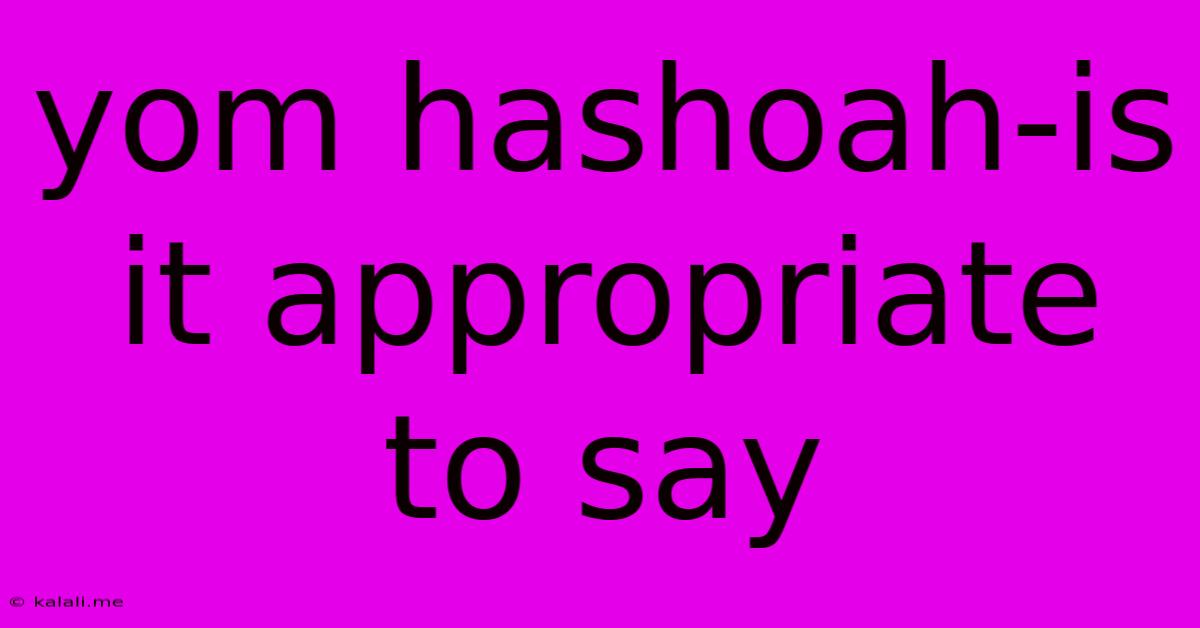Yom Hashoah-is It Appropriate To Say
Kalali
May 23, 2025 · 3 min read

Table of Contents
Yom Hashoah: Is it Appropriate to Say…? Navigating Sensitive Language and Commemoration
Yom Hashoah, or Holocaust Remembrance Day, is a solemn occasion dedicated to remembering the six million Jews systematically murdered during the Holocaust and millions of others persecuted under Nazi tyranny. This day demands sensitivity and careful consideration of the language we use to honor the victims and educate future generations. This article explores some common phrases used around Yom Hashoah, discussing their appropriateness and offering alternatives where necessary. It's crucial to approach this topic with empathy and respect for the profound suffering endured.
Understanding the Sensitivity: The Holocaust was a unique event in human history, characterized by unparalleled cruelty and systematic annihilation. Words can either appropriately convey the gravity of the situation or trivialize the unspeakable suffering. Therefore, choosing our words carefully is paramount.
Phrases to Consider Carefully:
-
"Just a number": While intended to highlight the dehumanization of victims, this phrase risks minimizing individual experiences and lives. It's better to emphasize the unique stories and resilience of individuals and communities. Focus on "victims of the Holocaust" and mention the unique characteristics of the individual whenever possible.
-
"The Holocaust happened a long time ago": This statement, though factually true, risks downplaying the ongoing impact of the Holocaust on survivors, their families, and the world. The trauma continues to affect generations, and the lessons learned remain acutely relevant. Instead, emphasize the continuing relevance and importance of remembering the event.
-
"They should have fought back harder": This statement ignores the complex circumstances faced by Jews under Nazi oppression, including limited access to weapons, the pervasive threat of violence, and the systematic dismantling of Jewish communities. It's crucial to recognize the immense challenges faced by those caught in the grip of the Nazi regime. Focus on the systemic oppression and violence imposed rather than placing blame on victims.
-
Using casual or insensitive language: Avoid using colloquialisms, jokes, or any form of language that minimizes the seriousness of the event. The Holocaust demands respect and reverence. Maintain a formal and respectful tone in discussions.
-
"Never again": While a powerful statement, this phrase should be coupled with concrete actions to prevent future atrocities. Mere words are insufficient; we need ongoing commitment to combating antisemitism, racism, and all forms of bigotry. Connect the statement with initiatives you support that combat hate and prejudice.
More Appropriate Language:
-
"Victims of the Holocaust": This is a respectful and accurate way to refer to those who perished.
-
"Survivors of the Holocaust": This term recognizes the strength and resilience of those who endured the atrocities.
-
"Remembering the victims and survivors of the Holocaust": This phrase is a comprehensive and respectful way to honor all those affected.
-
"Combating antisemitism and hatred": This highlights the importance of continuous vigilance against prejudice.
-
"Learning from the past to build a better future": This emphasizes the educational value of remembering the Holocaust.
Beyond Words: Actions Speak Louder
While choosing our words thoughtfully is important, it's equally crucial to actively engage in meaningful remembrance and education. Support organizations dedicated to Holocaust education and remembrance. Visit museums and memorials. Share stories and testimonies of survivors. These actions demonstrate a far greater commitment than words alone.
Yom Hashoah is not merely a day of remembrance; it's a call to action. By choosing our language carefully and actively engaging in remembrance and education, we can ensure that the lessons of the Holocaust are never forgotten. Remember the victims, honor the survivors, and strive to create a more just and peaceful world.
Latest Posts
Latest Posts
-
Borderlands 2 Random Game Save Files
May 23, 2025
-
How To Get More Ammo In Fallout
May 23, 2025
-
How Long Does Cooked Egg Last In The Refrigerator
May 23, 2025
-
What Gauge Wire For 50 Amp
May 23, 2025
-
How To Throw Grenade Fallout 4
May 23, 2025
Related Post
Thank you for visiting our website which covers about Yom Hashoah-is It Appropriate To Say . We hope the information provided has been useful to you. Feel free to contact us if you have any questions or need further assistance. See you next time and don't miss to bookmark.